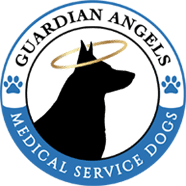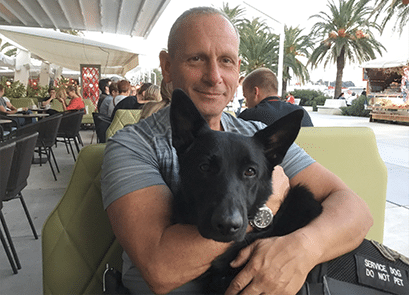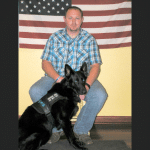A service dog serves as an extension of their recipient, helping them with daily tasks they can no longer do such as different levels of mobility/balance assistance, or alerting them in advance to medical issues such as low blood sugar, seizures, or PTSD episodes.
If you have been considering the idea of getting a service dog, you may be wondering where to start.
Assess Your Needs to Determine if You Qualify
To qualify to receive a service dog from Guardian Angels you must have a permanent disability. A permanent disability is something that would be life-altering, which prevents you from enjoying normal, everyday activities without assistance. Disabilities such as diabetes, seizures, PTSD, mobility and other invisible and visible disabilities may cause complications that create challenges for people to go out in public or to live at home alone. Some of these disabilities can become life threatening because of sugar levels changing – sometimes without the person realizing it, or they have a seizure which can result in catastrophic injuries, or a PTSD episode that ends in severe depression. If there is no one there to help in some of these scenarios, it could be fatal. Mobility is another permanent disability causing people to need assistance with balance and/or picking up dropped items, and more. Others may be in a wheelchair or have impaired use their hands or fingers. There are various levels of mobility challenges. Permanent disabilities interfere with everyday life functions.
In addition to qualifying medically for a service dog, our organization requires that you be physically, cognitively, and financially capable of taking care of the dog. We don’t train third party care givers or family members to help, so the disabled individual must be able to go through our pairings where they learn how the dog was trained, how to embrace that working relationship and care for their service dog. Depending on the severity of the situation, it may be okay if someone has to help you pour the dog food, but you have to be able to feed the dog, play with the dog, ask the dog for what you need, take the dog outside, etc. This helps to create an important relationship between the dog and recipient. This helps the dog know that he/she needs to work for that disabled individual. If someone else is feeding and caring for the dog, and all good things are coming from someone else, why would the dog pay attention to someone else. Establishing this connection is crucial, which is why we have set our training program up this way. If a caregiver or family member needs to remind the recipient of certain things they need to do, that is acceptable as long as the recipient is able to carry out the responsibility. Since a lot of people do have memory issues and may not have someone that can help them, there are aids you can use to remember the tasks for caring for the dog such as setting alarms.
You also need to be able to care for the dog financially. Your service dog will require premium dog food, veterinary care, grooming, toys and all the things that he needs and deserves to be kept in top condition. This dog will complete your life by doing tasks that you can no longer do on your own, so it is important that he be maintained properly.
Further Requirements:
If you qualify as having a permanent disability, you will be asked to provide confirmation of disability from your doctor.
Next, we will also look at your environment to be sure it is suitable for a service dog. Recipients must have permanent long-term housing in order to qualify.
If you have other pets, this complicates the situation. We will only place a service dog in a household where the other dog is of the opposite sex. There also must be someone else in the home to care for the pet. A service dog is a working dog and is not for the rest of the family to play with. We prefer no other pets be present in the family because they can distract the service dogs. It’s only natural that the service dog may want to play with the pet in the home which could cause him/her to miss important medical cues from his recipient. Additionally, if the pet in the home is not mannerly, it can lead to the service dog picking up their bad habits. Therefore, we prefer no other dogs or cats in the home. Other pets can make it very difficult for us to place a service dog in the home if not impossible.
As you can see, there are many different variable that we need to take into account to ensure we are setting our recipients up for success.
Become familiar with Service Dogs Laws
At Guardian Angels, we will provide recipients with education on service dog laws to ensure they are prepared for public outings with their service dogs and are aware of their rights and rules that must be followed.
Prepare Your Home for Your Service Dog
We prefer a fenced in yard, which can make life easier for recipients. If the home is not equipped with a fence, we recommend recipients find a fenced in area. Keep in mind, we do not allow our service dogs to be taken to dog parks. These are places where they can pick disease, parasites, and potentially be attacked by other dogs. If there is a fenced in playground, church yard, or somewhere nearby, that can be used to exercise the dog, this could be an acceptable solution.
All dogs require mental down time through proper play and exercise. This keeps them in top working shape both mentally and physically.
Before You Are Paired:
We do a series of educational orientations before the recipient is paired with their dog, where we will instruct them on what they need for their dog, how to properly care for their dog, what their expectations should be, what their new level of responsibility will be to the service dog, etc.
How Can I Apply for a Service Dog Through Guardian Angels Medical Service Dogs?
To apply for a service dog, you can visit our website or call for an application to be sent to you by US mail. We have an application tab on our website that will ask you a couple of questions and then forward an application to you. Once we have received your completed form, a member of our Recipient Relations team will reach out to you via email to continue the application process.
Please contact us today if you have any questions about service dogs or how to apply for one with our organization!
- Guardian Angels Medical Service Dogs, Bully Max, and Pittsburgh Pirates Team Up - April 26, 2024
- How to Take Advantage of the CTU Patriot Scholarship - April 5, 2024
- Benefits of Service Dogs for Veterans - April 3, 2024





